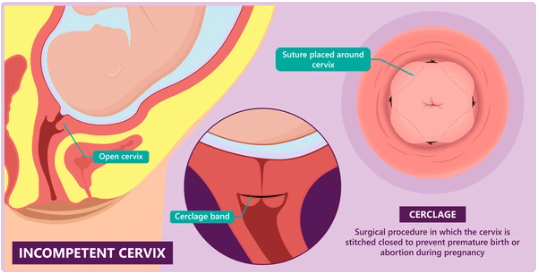Cervical incompetence, also known as cervical insufficiency, is a condition where the cervix is unable to stay closed during pregnancy, potentially leading to preterm birth or miscarriage. Understanding this condition is crucial for managing risks and ensuring a healthy pregnancy. Here’s what you need to know about cervical incompetence, including its causes, symptoms, and treatment options.
What Is Cervical Incompetence?
Cervical incompetence occurs when the cervix, the lower part of the uterus that opens into the vagina, is too weak to support the pregnancy. This weakness can cause the cervix to dilate and efface (thin out) prematurely, leading to early delivery or miscarriage, particularly in the second trimester.
Causes of Cervical Incompetence
- Structural Abnormalities: Some women have a naturally weak or structurally abnormal cervix that cannot provide adequate support for the pregnancy.
- Previous Cervical Surgery: Procedures such as a cone biopsy or cervical cerclage (surgical stitching of the cervix) can sometimes lead to weakened cervical tissue, increasing the risk of incompetence.
- Trauma or Injury: Trauma or injury to the cervix, whether from childbirth or other causes, can contribute to cervical incompetence.
- Congenital Abnormalities: In some cases, cervical incompetence is due to congenital abnormalities that affect the cervix’s strength and function.
Symptoms of Cervical Incompetence
Cervical incompetence may not always present with obvious symptoms, but common signs to watch for include:
- Painless Vaginal Bleeding: – Spotting or bleeding without pain can be an indicator of cervical issues.
- Pelvic Pressure or Discomfort: Feeling increased pressure in the pelvic area or discomfort may suggest that the cervix is starting to dilate.
- Change in Vaginal Discharge: An increase in vaginal discharge, particularly if it is watery or pinkish, might be a sign of cervical changes.
- Premature Contractions: Experiencing contractions before the expected time can indicate cervical issues, especially if they are accompanied by other symptoms.

Diagnosis and Monitoring
– Transvaginal Ultrasound: A transvaginal ultrasound can assess the length and condition of the cervix. A shorter cervical length may indicate incompetence.
– Pelvic Exam: During a pelvic exam, your healthcare provider may check for signs of cervical dilation or effacement.
– Medical History: Your healthcare provider will review your medical history, including any previous surgeries or pregnancies that may impact cervical strength.
Treatment and Management
- Cervical Cerclage Procedure: A cervical cerclage is a surgical procedure where a stitch is placed around the cervix to provide additional support. This is typically done between 12 and 24 weeks of pregnancy. Regular follow-ups are necessary to monitor the condition of the cervix and ensure the cerclage is effective.
- Progesterone Supplements: Progesterone helps maintain the pregnancy and can be prescribed if cervical incompetence is suspected or diagnosed. The supplements can be administered through injections or vaginal suppositories.
- Rest and Activity: Depending on your condition, your healthcare provider might recommend reducing physical activity or bed rest to alleviate pressure on the cervix.
- Regular Monitoring: Frequent ultrasounds and prenatal visits will be necessary to monitor the cervix’s condition and manage any potential complications.
Conclusion: Cervical incompetence is a serious condition but can often be managed effectively with appropriate medical interventions and monitoring. If you have concerns about cervical incompetence or experience symptoms suggestive of this condition, contact your healthcare provider promptly. Early diagnosis and treatment can significantly improve the chances of a healthy pregnancy and reduce the risk of preterm birth or miscarriage. Working closely with your healthcare team ensures you receive the support and care needed for a successful outcome.
